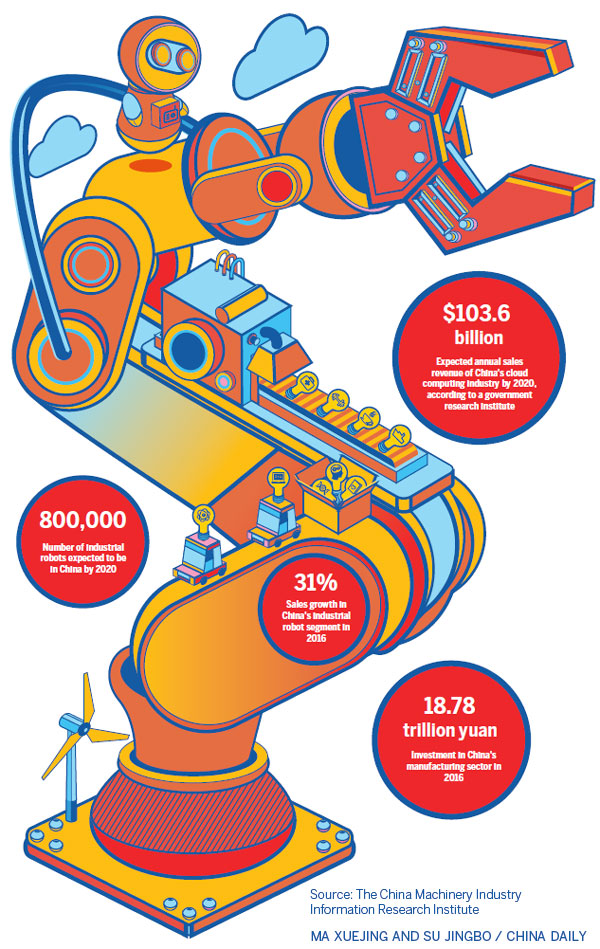Cloud with a silver lining
Made in China 2025 strategy leads to a spate of transformative technologies
The 19th China International Industry Fair held in Shanghai earlier this month confirmed for lay people what industry insiders have known for a while: Global corporate giants as well as domestic companies operating in China are determinedly ushering in industrial cloud computing as if their future depended on it.
"Cloud platform" refers to a new type of automated manufacturing that combines advanced machines with internet-connected sensors and big data analytics.
It is designed to boost intelligent manufacturing, which is characterized by a high level of productivity, efficiency and reliability of industrial production, experts say.
Industrial cloud heralds a new era in manufacturing that will not only showcase the country's coming of age in technology, but also set the tone for the rest of the world, they say.
Cloud has become integral to companies' implementation of the Made in China 2025 strategy, which envisions industry adopting state-of-the-art technologies to upgrade and to automate, wherever possible, the manufacturing process so that emphasis is on quality as well as quantity.
Best of all, consumers will benefit ultimately by way of better, even customized, products and services.
Industrial cloud computing, intelligent manufacturing based on industrial internet (also known as the internet of things), big data, artificial intelligence, augmented reality, virtual reality - for China, all are now par for the course.
He Dongdong, senior vice-president of Sany Heavy Industry Co, says intelligent manufacturing and robots are vital for the Made in China 2025 strategy to succeed.
No wonder big corporates are investing heavily on cloud platforms and related products in different forms. Their aim is to boost intelligent manufacturing in China. In the process, a healthy competition of sorts is unfolding.
Globally, the trend sprouted in 2014 when US-based General Electric launched its Predix platform. Germany's Siemens AG followed it up in 2016 by launching MindSphere, a cloud-based open internet of things operating system.
ABB Group of Switzerland and France's Schneider Electric SA also announced their own new platforms: ABB Ability and EcoStruxure, respectively, to create a whole new paradigm for the global manufacturing sector.
"An industrial cloud platform is able to enhance cross-industry digital service ability and extend from device to cloud - with devices, systems, solutions, services and a platform that enable customers to improve efficiency, add economic value and ensure precision in their products," says Gu Chunyuan, ABB's president for Asia, Middle East and Africa.
Sami Atiya, president of ABB's Robotics and Motion Division, says: "The global manufacturing industry is changing. Rising demand for individualization and customization is increasing the complexity of automation, bringing higher requirements for smart and communicating devices, flexible and efficient automation processes and seamless collaboration across the value chain."
The Swiss company offered a sneak preview this month of its new small robot, the IRB 1100, which can handle small parts and assembly functions in the manufacture of computers, communications equipment and consumer electronics.
At the industry fair in Shanghai, it became clear that other robot products aim at continuous press automation. They can speed up the production output rate, churning out up to 14 parts per minute in press lines. This has inspired several corporate moves.
In August, Siemens China set up its first research and development center in Chengdu, Sichuan province, for MindSphere.
In September, it reached an agreement with the Hong Kong Science Park to build the first MindSphere-based digitalization center for a smart city.
Earlier this month, Siemens also signed a strategic partnership with Shanghai Hytera Co, a communication equipment manufacturer, to provide digitalization design consulting and product lifecycle management software, as well as complete automation solutions to the company.
Wang Haibin, vice-president and general manager of the digital factory at Siemens China, says the partnership with Hytera represents another milestone in the company's efforts to promote digital transformation in local enterprises.
"The company will continue to leverage our advanced technologies in the electrification, automation and digitalization to create value for Chinese clients," he says.
Over the past year, Siemens has reached cooperation agreements with Chinese companies such as HBIS Group, Baowu Group, Jinyu Biotechnology, Cathay Industrial Biotech, Yunnan Baiyao and Jomoo, to provide consultation and solutions for digital upgrading, and to help customers benefit from digital transformation.
"China's growing demand for high-value products, especially automobiles and home-related services, offers many growth points," says Peter Tyroller, a board member at Robert Bosch GmbH responsible for the Asia-Pacific area.
The German mobility, industrial and software conglomerate and the Chinese search engine company Baidu signed a strategic cooperation agreement on smart mobility in China in June.
Bosch will be involved in Baidu's Apollo project, which aims to provide open software for the development of automated vehicles.
Under the deal, Bosch will contribute sensors and its Bosch Road Signature mapping service for vehicle localization. Both companies will provide technical expertise to support the drafting of legislation relating to automated driving in China.
Shi Yong, vice-president of the Beijing-based China Machinery Industry Information Research Institute, says cloud platforms will continue to push Chinese companies in many emerging as well as traditional sectors.
They will feel the need to adopt trends in digital, intelligent, service-oriented and platform-based development to enrich their operations, he says.
China has set a goal for itself to establish up to 300 demonstration projects throughout the country by 2020, including 40 system solution providers with more than 1 billion yuan ($151 million; 128 million euros; £114 million) in annual sales revenue, according to the China Information Technology Industry Federation.
Rather than waiting for government policy to stimulate the market, domestic companies China Aerospace Science and Industry Corp, Sany and Haier Group have all pushed their own industrial cloud platforms to grab as much market share as possible.
CASIC, the State-owned defense giant, has been striving to promote its CASICloud website over the past two years. Launched in June 2015, the website was designed to enable users to benefit from the industrial internet.
"We thought of adopting the industrial internet several years ago, as CASIC was seeking to better coordinate its research and production in the manufacture of space products," says Shu Jinlong, chairman of CASICloud Technology Co, a subsidiary of CASIC that is responsible for operating the Chinese platform.
"With the introduction of our internal industrial internet, we have improved the efficiency and productivity of institutes and factories under CASIC. So we hope that the industrial internet can help more businesses."
So far, more than 800,000 businesses, including 3,000 foreign companies, have begun using CASICloud, and more than 90 percent of them are small, privately owned ones, according to CASIC.
zhongnan@chinadaily.com.cn

(China Daily European Weekly 11/24/2017 page26)









